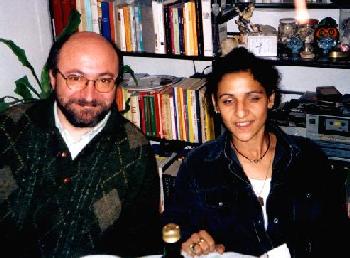We have to leave. During the night,
Xhevrija, Bajram and Reska all dreamed of the same dead relative, Reska's
grandmother. So we have to set out at once, in order to save Remzija, Reska
and Lulzim's sister.
Remzija was married at sixteen to Kadri in
Zagreb; when the country sunk, this city became part of another nation,
Croatia. Kadri is and is not Rom, for himself and for the world, he is
an Albanian.
One day, after eleven years during which
almost nothing had been heard from her, Remzija escaped, leaving five children
behind her. However, blackmailed with the children and a stream of promises
from her husband, she went back again, and we heard no more about her except
that she had had a sixth child.
Now however a tremor runs through the cobweb.
A relative of Kadri has seen Remzija and discovered that she is kept prisoner
and risks being killed; the relative called another relative in Serbia
who got in touch with a relative in Germany who called the camp in Brescia...
a bottle cast into the ocean had found a reader for its message.
But what can be done? The only person who
knows how to move around the world, at least a little, is Reska. But Reska
is a Serbian citizen, and Serbs are not allowed into Croatia without special
reason. And even if she should get a visa, she would have to be back in
Italy by November 1st, 1999, so as not to let her permit run out.
I go with her to the Croatian consulate in
Milan. She tells me the whole camp is frightened at the idea. However,
the consul, Mr Josko Boskulic, is unexpectedly helpful, and grants a visa
for "extraordinary reasons." We go back to the station on the subway, with
Reska looking around herself a little overwhelmed.
Reska and I leave for the East, listening
to tapes of the music of four worlds - Serbia, Albania, Turkey and the
landless land of the Roma. The car is a little mosque, with an Islamic
rosary and the banner of the shahada - partly out of faith, partly
because this way the Tunisian drug pushers who enjoy smashing cars will
leave hers alone.
She drives - I don't have a licence. But
how come an invalid and utterly penniless Rom girl has a car; and why are
her arms and fingers covered with golden bracelets and rings?
Thanks to her father's job, the family had
enjoyed better days. Now he is waiting to be called back to work, and in
the meantime he is begging in the centre of Brescia, but he is always ready
to work hard. Luckily, the good days have left at least a car behind them
- fifth hand, automatic gearbox, paid for in instalments. Reska had
dreamed that the very bodiless voice of Allah had promised her that that
day, she would find a car; and so it happened.
The golden bracelets and rings are gifts,
each with its own history.
A new obstacle awaits us at Trieste: the
visa to cross Slovenia. I am Italian, and can cross the border just with
my ID card. She is a Balkan nobody, and cannot do the same.
The Slovene visa is quite explicit. We present
the request at nine in the morning. No need for pictures or explanations.
Not even for the person asking for the visa - I go to pick it up myself
so she does not have to go up the stairs. At twelve o'clock, I enter the
consulate. At the end of the room is an employee behind a pane of armoured
glass.
"Hello, I am here for the visa of Rezijana
Berisha".
"A hundred thousand lire".
I give him the money and take the passport.
"Is that all?"
"Yes".
"Goodbye". No answer. I leave. Outside,
another person is waiting with a hundred thousand lire bill ready in his
hand.
We drive through Slovenia and reach Zagreb
- Swiss dress, Neapolitan belly and the cold and dangerous heart of Bulgaria
or Anatolia.
We start looking for Ulica Misheveçka,
the street where Remzija lives.
You are welcome to use this article
on condition that you put the whole text of "Collateral Lives" on your
website and provide a link to http://www.kelebekler.com/
